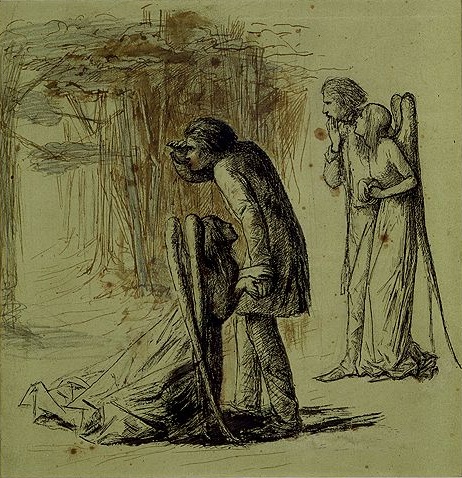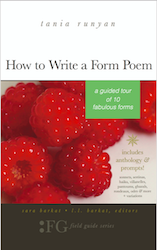< Return to Edgar Allan Poe Poems
Ulalume
The skies they were ashen and sober;
The leaves they were crisped and sere—
The leaves they were withering and sere;
It was night in the lonesome October
Of my most immemorial year;
It was hard by the dim lake of Auber,
In the misty mid region of Weir—
It was down by the dank tarn of Auber,
In the ghoul-haunted woodland of Weir.
Here once, through an alley Titanic.
Of cypress, I roamed with my Soul—
Of cypress, with Psyche, my Soul.
These were days when my heart was volcanic
As the scoriac rivers that roll—
As the lavas that restlessly roll
Their sulphurous currents down Yaanek
In the ultimate climes of the pole—
That groan as they roll down Mount Yaanek
In the realms of the boreal pole.
Our talk had been serious and sober,
But our thoughts they were palsied and sere—
Our memories were treacherous and sere—
For we knew not the month was October,
And we marked not the night of the year—
(Ah, night of all nights in the year!)
We noted not the dim lake of Auber—
(Though once we had journeyed down here)—
Remembered not the dank tarn of Auber,
Nor the ghoul-haunted woodland of Weir.
And now as the night was senescent
And star-dials pointed to morn—
As the sun-dials hinted of morn—
At the end of our path a liquescent
And nebulous lustre was born,
Out of which a miraculous crescent
Arose with a duplicate horn—
Astarte’s bediamonded crescent
Distinct with its duplicate horn.
And I said—”She is warmer than Dian:
She rolls through an ether of sighs—
She revels in a region of sighs:
She has seen that the tears are not dry on
These cheeks, where the worm never dies,
And has come past the stars of the Lion
To point us the path to the skies—
To the Lethean peace of the skies—
Come up, in despite of the Lion,
To shine on us with her bright eyes—
Come up through the lair of the Lion,
With love in her luminous eyes.”
But Psyche, uplifting her finger,
Said—”Sadly this star I mistrust—
Her pallor I strangely mistrust:—
Oh, hasten!—oh, let us not linger!
Oh, fly!—let us fly!—for we must.”
In terror she spoke, letting sink her
Wings till they trailed in the dust—
In agony sobbed, letting sink her
Plumes till they trailed in the dust—
Till they sorrowfully trailed in the dust.
I replied—”This is nothing but dreaming:
Let us on by this tremulous light!
Let us bathe in this crystalline light!
Its Sibyllic splendor is beaming
With Hope and in Beauty to-night:—
See!—it flickers up the sky through the night!
Ah, we safely may trust to its gleaming,
And be sure it will lead us aright—
We safely may trust to a gleaming
That cannot but guide us aright,
Since it flickers up to Heaven through the night.”
Thus I pacified Psyche and kissed her,
And tempted her out of her gloom—
And conquered her scruples and gloom;
And we passed to the end of a vista,
But were stopped by the door of a tomb—
By the door of a legended tomb;
And I said—”What is written, sweet sister,
On the door of this legended tomb?”
She replied—”Ulalume—Ulalume—
‘Tis the vault of thy lost Ulalume!”
Then my heart it grew ashen and sober
As the leaves that were crisped and sere—
As the leaves that were withering and sere;
And I cried—”It was surely October
On this very night of last year
That I journeyed—I journeyed down here—
That I brought a dread burden down here!
On this night of all nights in the year,
Ah, what demon has tempted me here?
Well I know, now, this dim lake of Auber—
This misty mid region of Weir—
Well I know, now, this dank tarn of Auber,—
This ghoul-haunted woodland of Weir.”
-Edgar Allan Poe
Enjoy this Artistic Interpretation of “Ulalume” by Edgar Allan Poe

Illustration for Edgar Allan Poe’s poem “Ulalume” by Dante Gabriel Rossetti, ca.1847-1848
Listen to Readings of “Ulalume”
Listen to Musical Interpretations of “Ulalume” by Edgar Allan Poe
That’s it for Ulalume by Edgar Allan Poe videos!
About Edgar Allan Poe
Edgar Allan Poe (1809-1849) published his first collection of poems, Tamarlane, and Other Poems, in 1827, when he was 18 years old. A tendency to run up debts (including for gambling) kept him in constant state of reinvention – college student, poet, short story writer, soldier/officer school, literary journal editor and critic.
The Poe who arises from Symons’ hand (his biographer in The Telltale Heart: The Life and Works of Edgar Allan Poe) is a man who first and foremost was determined to put Southern letters on the map, aiming to wrest control from the literary establishment in New York and New England (Poe aimed some rather pointed arrows at writers like Henry Wadsworth Longfellow). For his own writing, he wanted to be considered a poet. The poems were the important works; the stories were almost after-thoughts, almost dashed off primarily to raise funds. And he always needed money.
His personal life seemed to have stayed a general mess, but he had an enormous impact on both American and world literature. Consider the stories and poems that have been filmed, published, re-published, anthologized, celebrated and widely admired for more than 150 years: “Murders in the Rue Morgue,” “Fall of the House of Usher,” The Raven, “The Tell-Tale Heart,” Annabel Lee, “The Bells,” “Ulalame,” “To Helen.”
We associate Edgar Allan Poe with 19th century gothic. His stories are full of mystery, passion, horror, violence, death, and the supernatural. And yet his poems, especially “The Raven” and “Annabel Lee,” made him famous in pre-Civil War America and established his literary reputation.
Questions and mystery surrounded Poe’s own life and death, and continue even today – we may never know who left three roses and a bottle of cognac on his grave in Baltimore for decades until 2011 (alas, the “Poe Toaster” disappeared or died, to be seen nevermore).
You can read more about Poe’s biography in the articles Poets and Poems: Meeting Edgar Allan Poe and Forgotten Classics, The Telltale Heart by Julian Symons by Glynn Young, from which this biography was compiled.
I hope you enjoyed Ulalume by Edgar Allan Poe!
BUY ‘HOW TO WRITE A FORM POEM’ NOW!
